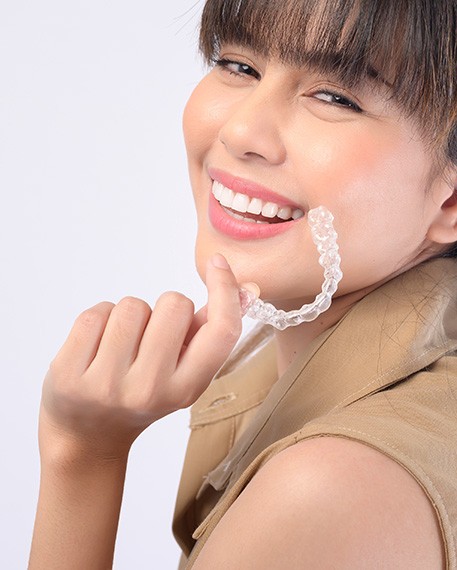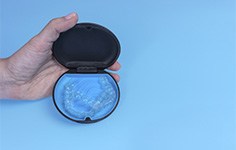Invisalign - Parsippany-Troy Hills, NJ
The Discreet & Comfortable Way to Straighten Teeth

If you’ve been dreaming of a straighter smile but want to avoid the look and feel of bulky metal braces, Invisalign clear braces may be the orthodontic option for you.
Why Should I Choose Invisalign?

Invisalign in Parsippany-Troy Hills is a great option for teens, adults, and anyone looking for a discreet orthodontic solution. Using clear plastic trays to gently exert pressure on your teeth, these aligners shift them into the desired position. They are thin, nearly invisible, comfortable, and removable. With traditional braces, you have to change your diet, your at-home oral hygiene routine, and deal with hard metal brackets and sharp wires that can poke your gums and cheeks. This is not the case with Invisalign! You can enjoy your normal routine while watching your teeth become straighter right before your eyes.
Goodbye Goopy Impressions!

Creating your custom Invisalign trays has never been easier thanks to digital scanning. Say goodbye to goopy impression trays and hello to your best smile yet!
Who Can Invisalign Help?

Invisalign is a great alternative to traditional braces, as it is able to correct a wide range of misalignment issues without the use of metal brackets and wires. If you have one of the following problems, Invisalign could be the solution for you.
Crowded Teeth
When teeth are crowded and overlapping, they can negatively affect the appearance and health of your smile. Overcrowded teeth can also increase your risk of developing cavities or grinding your teeth, therefore resulting in premature wear and tear. Fortunately, Invisalign is able to gently guide the teeth into proper position and effectively correct crowding.
Gaps Between Teeth
Teeth that are spaced too far apart can also have a negative impact on your oral health, making it challenging to floss and brush thoroughly. It can also affect your bite and speech patterns. The good news is that Invisalign can correct gapped teeth.
Overbite
An overbite occurs when the top teeth are coming out too far from the lower arch of the teeth. Overbites can cause you to experience jaw pain, speech problems, uneven dental wear, and difficulty opening and closing your mouth. This issue can also result in the top teeth being exposed, increasing their risk of injury.
Underbite
An underbite describes when the bottom teeth go slightly passed or match with the top row of teeth when you close your mouth. This can result from multiple different factors, including genetics, jaw injury, and non-nutritive habits, like thumb sucking and pacifier use late into childhood. A lot of the time, patients with underbites need to use rubber bandings and other attachments in addition to their clear aligners. This helps to address the bite and shift the lower arch into the proper position.
Crossbite
When the bottom teeth are slightly in front of the upper arch, this is called a “crossbite.” It is usually a result of genetics or premature loss of baby teeth. When left untreated, crossbites can result in a variety of problems, like increased risk of gum disease, tooth decay, speech difficulties, headaches, teeth grinding, and facial asymmetry. Invisalign can correct this issue in most cases.
Open Bite
When the top and bottom teeth aren’t overlapping or touching when you close your mouth, this is called an “open bite.” Most of the time, this is due to poor bone development or nonnutritive habits – like prolonged thumb sucking and pacifier use. An open bite can also lead to difficulty pronouncing certain sounds and words, as well as excessive enamel wear on the back teeth. Invisalign can bring the top and bottom teeth together, correcting the bite patterns and reducing additional damage.
The Benefits of Invisalign

They’re Removable
Brush and floss normally and keep eating your favorite foods.
Unparalleled Comfort
No metal brackets or wires to poke your gums or cheeks here!
Rapid Results
Watch your smile transform before your eyes in as little as 12 months.
The Invisalign Treatment Process
Initial Consultation & Exam

During your first visit, your Parsippany cosmetic dentist will take a look at your bite and smile to determine if Invisalign is the right option for you. This is also a great opportunity for you to ask any questions that you may have about your smile, Invisalign, or other treatment options.
Aligner Pick Up

Once you’re approved for treatment, we will take scans or impressions of your teeth to ensure your Invisalign trays fit perfectly. When your aligners arrive at our office, you’ll come and pick them up to begin your treatment.
Check-ins

Every six weeks or so, you’ll come back to our office to pick up your next few sets of aligners. Every treatment plan is different, so this amount of time may vary based on your needs. These check-ins are essential to ensure your treatment is on track and that your Invisalign trays are fitting properly.
Understanding the Cost of Invisalign

If you want to achieve a straighter smile but aren’t fond of the idea of wearing metal brackets and wires on your teeth, Invisalign may be the best option for you! However, many people worry about the cost of their treatment. During your complimentary Invisalign consultation, we will discuss the financial aspects of your treatment in detail so that you don’t run into any surprises. Until then, here are some things to take into consideration.
Factors That Affect the Cost of Invisalign

The cost of Invisalign varies from person to person. Here are the factors that play a role in this:
- Arches: Most people who get Invisalign need to have both of their arches addressed. However, in some cases, only one needs correction. If this applies to your situation, the cost will be lower.
- Complexity: If you have more severe misalignment issues, your treatment may cost more. Closing a few small gaps is less costly than correcting significant bite problems.
- Length of Treatment: A longer treatment time means additional aligners and a higher cost.
- Compliance: If you aren’t wearing your aligners as long as you should, it could take longer to complete treatment.
Invisalign vs. DIY Mail-In Aligners: Which Costs More?

If you are seeking a “quick fix,” mail-in aligners may be tempting. However, a lower cost doesn’t necessarily mean that it is a better option. The price is generally lower than Invisalign, but mail-in aligners have a do-it-yourself approach with little-to-no oversight from a dental professional. This means more room for error, so you could end up with some serious issues , such as, more misalignment, gum recession, TMJ pain which can cause to a more costly fix.
By choosing Invisalign instead, you have the trusted oversight of your dentist for each step along the way. Invisalign is professionally made, uses a highly accurate scan, and results in a more successful treatment. The cost difference is worth it for a smooth, stress-free orthodontic treatment.
Does Dental Insurance Cover Invisalign?

Sometimes, dental insurance plans offer partial coverage for orthodontic treatment, so you should check with your provider directly to see if this applies to you. At Zen Dental Care, we are proud to accept all major PPOs, including Delta Dental. Cigna, Aetna, MetLife, Guardian, BlueCross BlueShield, United Healthcare, GEHA, and more! To find out if we accept your plan, give us a call.
Options for Making Invisalign Affordable

If you don’t have dental insurance, this doesn’t necessarily mean that you will be left completely on your own. We are happy to accept payments through CareCredit – a third-party financing company that can split the cost of your treatment into manageable monthly installments with little to no interest. To learn more about your financial options, don’t hesitate to talk to one of our friendly team members!
Frequently Asked Questions
Can I use my Invisalign trays as a nightguard?
While Invisalign trays look very similar to night guards and mouthguards, we do not recommend that you use Invisalign as a nightguard. The clear plastic trays are designed to gently shift your teeth, not protect them. If you grind your teeth at night, we may recommend that you get a night guard to protect your teeth and go with traditional braces instead of Invisalign. If you wear your aligners at night and notice that they are becoming cracked or worn down, this may be a sign that you are grinding your teeth at night. This will affect your Invisalign treatment so be sure to let your doctor know right away if you think you might be grinding your teeth.
Can you see Invisalign trays when you’re wearing them?
Invisalign aligners are nearly impossible to see when wearing them. This is because they are made out of clear plastic and are perfectly fit to your smile. Your trays will be custom-made to fit your gum line for a more seamless look. Plus, there are no metal brackets or wires, so you can feel confident in your smile throughout treatment. However, if you eat or drink with your aligners in, they could become stained, making them more visible.
How are Invisalign trays made?
These clear aligners are designed onto a mold of your teeth. A lab technician will apply layers of a photo-sensitive liquid resin to this custom mold. Next, the technician will expose this resin to a laser, curing it into a hard, yet flexible, thermoplastic. This plastic is called SmartTrack®, and it was created exclusively for Invisalign treatment. It’s FDA-approved and contains no BPA, BPS, latex, or gluten.
How much does Invisalign cost?
The cost of treatment with Invisalign is usually comparable to the cost of traditional braces. Every case is different, though, so it’s important to discuss your budget with your dentist in Parsippany. During your complementary Invisalign consultation, Dr. Sheren Elsaid will consider multiple factors including your needs, your lifestyle, and your budget before helping you decide which treatment to proceed with.
Am I a good candidate for Invisalign?
If you have minor or moderate orthodontic issues, you are likely a good candidate for treatment with Invisalign. So long as your mouth is free of any oral health issues like gum disease or tooth decay, you will probably be eligible to proceed with treatment. However, Invisalign is not for everyone. Severe orthodontic issues may not be able to be addressed with Invisalign. In these cases, we usually recommend treatment with traditional metal or ceramic braces as they can provide more powerful results. To find out about your options for orthodontic treatment, schedule your consultation today!
What if I crack my Invisalign aligners?
If you notice that your aligners become damaged, cracked, worn, or if you lose them, contact your doctor right away. If you delay this will only prolong your treatment and could reverse the progress you have made. In the event that you lose your aligners or if they become damaged, let us know and we will help you get back on track.
How do I wear my Invisalign aligners?
For most patients, your treatment plan will indicate that you wear your aligners for 20-22 hours per day, however, this may vary based on your unique needs. When in doubt, we recommend wearing your aligners at all times except for when you take them out to eat, drink, brush, and floss. This will ensure you are getting the most out of your treatment and that your teeth are shifting as quickly as possible.
How do I care for my Invisalign aligners?
Caring for your Invisalign trays is quite simple. All you need to do is brush them with a toothbrush and toothpaste when you brush your teeth. If you are in a situation that prevents you from cleaning them, you can rinse them with lukewarm water. It is important to avoid rinsing them with hot water as this could warp the trays.
Does Invisalign hurt?
While Invisalign is usually more comfortable than traditional braces, there is still some discomfort associated with all orthodontic treatments. Since we will be shifting your teeth, you may notice tenderness and soreness as you get used to each new set of trays. Invisalign works by applying gentle pressure to your teeth which in turn creates inflammation that signals your tooth roots to shift. If you would like to lessen your discomfort during the initial adjustment period, we recommend that you take Tylenol. It is important to avoid ibuprofen because it is an anti-inflammatory and actually hinders the tooth movement process.
